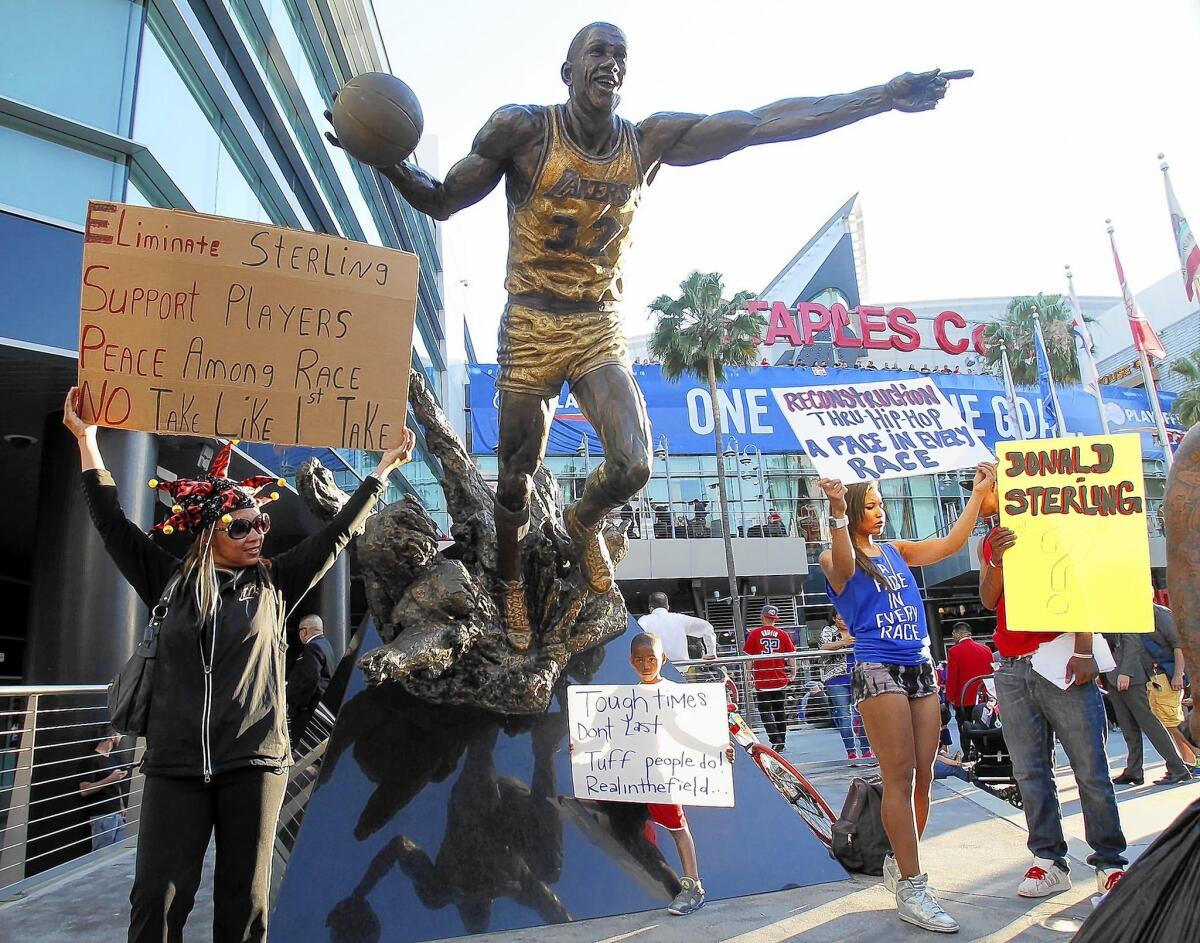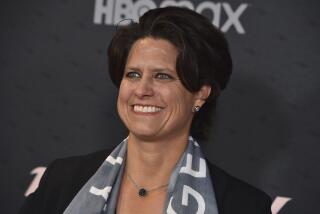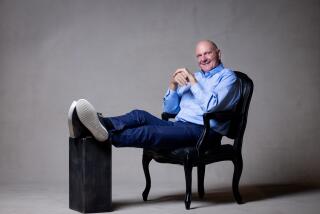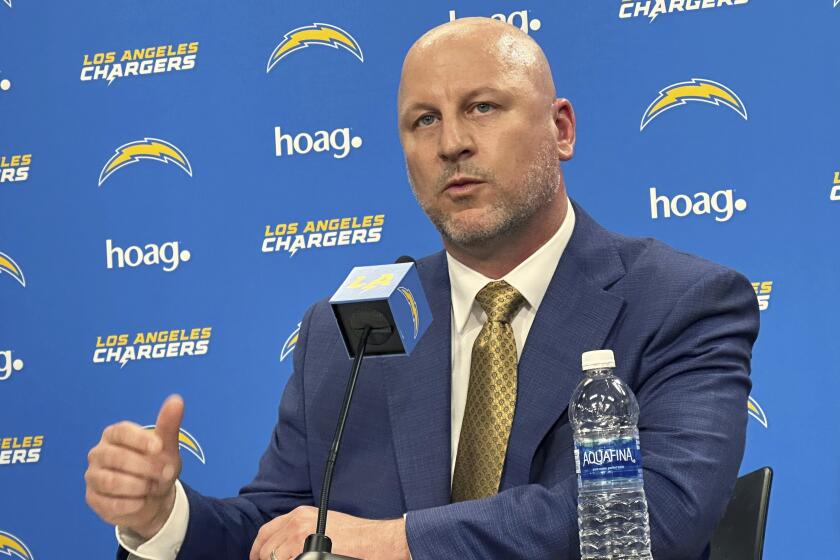Clippers owner Donald Sterling gets lifetime NBA ban

Taking actions with little precedent in American professional sports history, NBA Commissioner Adam Silver on Tuesday banned Los Angeles Clippers owner Donald Sterling from the basketball league for life and said he would push hard to get other NBA owners to force Sterling to sell his franchise.
The sanctions for what the commissioner called Sterling’s “deeply offensive and harmful” language about African Americans could mean the end of the Clippers’ owner’s tumultuous 33-year reign over one of big league sports’ most inept teams just as it appears poised for championship-caliber play.
The lifetime ban, along with a $2.5-million fine, came less than four days after audio recordings released by two websites unleashed waves of anger and disdain for Sterling. The recordings captured the 80-year-old Clippers’ owner telling a female friend he did not want to see her at Clippers games with black people. The NBA said its investigation confirmed that it was Sterling’s voice on the recording before the league imposed its harshest penalty ever.
Silver said the remarks were “contrary to the principles of inclusion and respect that form the foundation of our diverse, multicultural and multiethnic league.” About three-quarters of the league’s 400 players are black. Silver’s swift and forceful response to the biggest crisis facing the NBA in memory gained wide praise within and outside the NBA.
Sterling, though, remained mostly silent and out of public view. Shortly before Silver spelled out his sanctions, Fox News contributor Jim Gray said he had spoken to Sterling, who said he had no idea what punishment would be meted out. Gray said Sterling told him, “The team is not for sale.”
Sterling, a lawyer, apartment magnate and the longest tenured owner in the NBA, has a reputation for combativeness. He spent years fighting the NBA when the league tried to prevent him from moving the San Diego Clippers to Los Angeles.
“He’s obviously very litigious and he’s cantankerous,” said Andrew Zimbalist, a professor of sports economics at Smith College. “It’s very hard to predict what he would do.”
After posting losing records in 30 of their 36 seasons in San Diego and Los Angeles, the Clippers have a chance in this postseason to advance beyond the first round of the playoffs for just the third time in team history. Clippers Coach Doc Rivers said the commissioner’s pronouncement represented the “sigh of relief” that the team needed to refocus in time for Tuesday night’s playoff game against the Golden State Warriors.
Outside Staples Center on Tuesday night, Clippers’ fans showed solidarity with their team and distaste for its longtime owner. Many wore black shirts or armbands. Others turned their team jerseys inside-out, as Clippers players had done with their warm-up shirts two days earlier.
A Diamond Bar couple held signs that read: “”Dear NBA owners, Must have new owner! VOTE FOR SALE!” About 100 protesters outside the arena on Figueroa Street chanted: “Hey! Hey! Ho! Ho! Donald Sterling has got to go!”
The Clippers’ owner had been condemned by President Obama, L.A. Mayor Eric Garcetti and top figures from the NBA’s past and present. On Tuesday, Sterling’s own management team distanced itself from the owner, posting a “WE ARE ONE” message on the team’s Internet site.
“As an organization, we wanted to make a stand, apart from Sterling’s comments,” said Seth Burton, the team’s vice president of communications. “As players, coaches and an organization, we don’t agree with those comments.”
Silver pledged to do “everything in my power” to get Sterling to sell. The commissioner will need the backing of three-quarters of team owners. A league spokesman said a date for a vote had not been set.
Without specifying how many owners he had queried about the move, Silver declared Tuesday: “I fully expect to get the support I need from the other NBA owners to remove him.”
Those who spoke out immediately after Silver’s announcement signaled their approval, including owners of the Los Angeles Lakers, Indiana Pacers, Phoenix Suns, Atlanta Hawks, New Orleans Pelicans, Orlando Magic, Chicago Bulls and Dallas Mavericks.
Jeanie Buss, governor of a Lakers franchise that long overshadowed the Clippers in L.A., called Silver’s action “decisive, firm and compelling.” Magic Chairman Dan DeVos said, “We are wholeheartedly behind Adam’s recommendation and plan to vote accordingly.”
From Monday to Tuesday, Dallas Mavericks owner Mark Cuban reversed himself, first saying harsh punishment for inappropriate statements could be a “slippery slope” that would harm other owners in the future, then tweeting that he agreed “100%” with Silver’s actions.
Roger Mason Jr., a vice president of the players’ association, said players would keep the pressure on. “We want immediate action and a timetable from the owners of when this vote is going to happen,” Mason said.
He said players had been prepared to boycott playoff games if Silver did not impose tough sanctions against Sterling. But in a news conference outside Los Angeles City Hall, current and former NBA stars expressed gratitude for what Lakers guard Steve Nash called “quick, unequivocal and decisive” action. Lakers’ legend Kareem Abdul-Jabbar hailed “a new day” in Los Angeles sports. Magic Johnson praised Silver for “great leadership.” (Sterling’s anger, and the resulting audio recording, apparently stemmed from a decision by his friend, V. Stiviano, to post a photo on social media that she took of herself with Johnson.)
Although ultimate control of the Clippers remained in flux, Silver said the lifetime ban took effect immediately. Sterling is barred from NBA games or practices. He is not allowed to enter Clippers facilities or to participate in any business or player personnel decisions. He is also banned from the NBA’s board of governors meetings and league activities.
Silver called the $2.5-million fine the highest allowed under the NBA constitution and said the money would be donated to organizations that promote tolerance and fight discrimination. Silver’s penalties equaled or exceeded previous sanctions imposed on American pro sports owners. Major League Baseball meted out a lifetime suspension against Cincinnati Reds owner Marge Schott in 1996 after she made statements supportive of Adolf Hitler. Schott sold the team three years later.
Yankees owner George Steinbrenner suffered three suspensions before a “lifetime” ban in 1990 for having player Dave Winfield followed. But baseball reinstated the Yankees boss three years later.
The harshest previous punishment in the NBA came in 2000, when Minnesota Timberwolves owner Glenn Taylor was suspended for a year, fined and lost five No. 1 draft picks for circumventing the league’s salary cap.
The Sterling controversy broke into public view late Friday evening, when gossip website TMZ posted an audio recording of Sterling in conversation with the 31-year-old Stiviano, who identifies herself as black and Mexican. Deadspin posted additional minutes of the conversation Sunday.
Silver said he was “shocked” when he first heard the recording and immediately initiated an investigation, led by an attorney who once worked as an assistant U.S. attorney.
Asked whether the Clippers boss should be held accountable for comments made in private, the commissioner responded: “Whether or not these remarks were shared in private, they are now public and they represent his views.”
Silver said he stayed in frequent contact with other owners and Sacramento Mayor Kevin Johnson, a former NBA star who represents current players, during the three-day inquiry, which concluded late Monday.
He reached his decision Tuesday morning and informed Clippers representatives shortly before he went on national television to announce Sterling’s fate.
The pressure on the NBA to do something about Sterling’s words came not just from fans and players but from sponsors. At least 15 companies said they had cut or suspended their ties with the team.
UCLA announced Tuesday that it would return a $425,000 donation the Clippers owner made for kidney research. The university’s statement said that Sterling’s words showed he “does not share UCLA’s core values as a public university that fosters diversity, inclusion and respect.”
At least six individuals reportedly have interest in owning the Clippers, whom Sterling bought for $12.5 million in 1981. Among the prospective buyers are Johnson, the onetime Lakers star; mall developer Rick Caruso; entertainment magnate David Geffen; technology billionaire Larry Ellison; Patrick Soon-Shiong, the billionaire biotech investor; and boxing champion Floyd Mayweather Jr.
Times staff writers David Zahniser, Harriet Ryan, Jim Peltz, Tiffany Hsu, Nathan Fenno, Emily Alpert Reyes, Kate Mather, Angel Jennings, Ryan Menezes and Stuart Pfeifer contributed to this report.
More to Read
Go beyond the scoreboard
Get the latest on L.A.'s teams in the daily Sports Report newsletter.
You may occasionally receive promotional content from the Los Angeles Times.













